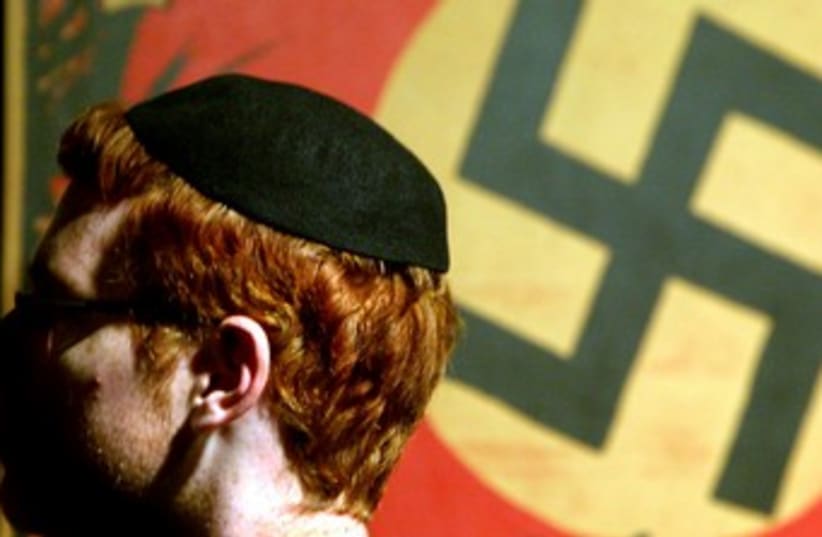In a preliminary reading, the Knesset passed legislation this week that seeks to make it illegal to use the word “Nazi” or Holocaust symbols except in certain educational or historical contexts. If it becomes law, the measure will place an unnecessary limit on freedom of speech. It is an absurd attempt to police the etiquette of speech through legislation.According to the proposal, the use of Nazi or Holocaust symbols, calling someone “Nazi” or similar names or expressing hope that the Nazis’ plan will be completed will carry a NIS 100,000 fine and can be the subject of civil suits.Unfortunately, the bill seems to conflate incitement – including incitement to genocide – with the use of the word “Nazi” as an anathema.
The UN Genocide Convention, for instance, outlaws not only acts of genocide but “incitement” to genocide, a crime that should be punished even if the genocide never takes place. The convention’s goal is to prevent a genocide before it takes place. If the convention had been enforced in Rwanda, for instance, the lives of close to a million innocent civilians might have been saved.And if the convention had been enforced against Iran, president Mahmoud Ahmadinejad would have been arrested and prosecuted instead of being allowed to address the UN General Assembly. Websites affiliated with Iranian Supreme Leader Ali Khamenei that spout incitement to destroy Israel would be targeted for censure by the international community.Similarly, regular incitement to violence against Israelis by official Palestinian media sources should be combated within the framework of peace negotiations presently going on under the orchestration of US Secretary of State John Kerry.Israel passed its own legislation outlawing incitement to violence after the assassination of prime minister Yitzhak Rabin in 1995.Those who incite to genocide or to murder often invoke freedom of speech. But no free-speech law should protect speech designed to motivate people to commits crimes against humanity.In contrast, the legislation proposed by MK Shimon Ohayon (Likud Beytenu) and MK Elazar Stern (Hatnua) seems to be attempting to achieve a completely different goal: the policing of speech etiquette.When demonstrations get heated and demonstrators lose control of their mouths and shout “Nazis!” at police and soldiers attempting to maintain order or when they wear striped pajamas and yellow stars like the ones worn by Holocaust victims, this is distasteful and uncalled-for, whether those demonstrators are left-wing activists protesting against the West Bank security barrier in places such as Bil’in, haredim fighting against Shabbat desecration or secular encroachment in Mea She’arim or Beit Shemesh, or hilltop youth battling against the destruction of an illegal outpost. But never do these hotheaded activists intend to incite to genocide. Rather, they are doing quite the opposite, they are accusing their opponents of behaving in a violent way. It is just that their use of metaphor is not particularly tactful.Attorney-General Yehuda Weinstein, who opposes the legislation, noted pointedly that “not all behavior that offends the public is deserving of being criminalized.”Passing the bill in its present ambiguous form would create absurd situations. For instance, it would outlaw Abba Eban’s reference to the 1949 Armistice Lines as “Auschwitz borders,” a reference Deputy Foreign Minister Ze’ev Elkin recently reiterated during a tour of the Jordan Valley. It would forbid Prime Minister Binyamin Netanyahu to compare leaders of Iran’s Islamic Republic to Nazis, as he did in 2008 when he said, “Ahmadinejad is a modern Hitler” in a conversation with Stephen Haldey, US national security adviser in the Bush administration.Using legislation to fight incitement – whether it be incitement to genocide or incitement to murder or to violence – is completely legitimate. And there are already laws in Israel and in the international community that outlaw such incitement. Unfortunately, too often these laws are not enforced.The exploitation of the word “Nazi” or of Holocaust imagery, however, while distasteful and improper, is best combated through education and the promotion of a public discourse that rejects the belittling of the memory of the Shoah and its victims.Policing speech
The exploitation of the word “Nazi” or of Holocaust imagery is best combated through education and the promotion of a public discourse.
